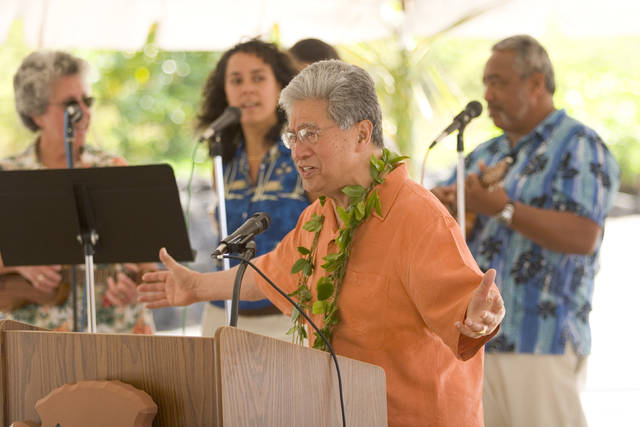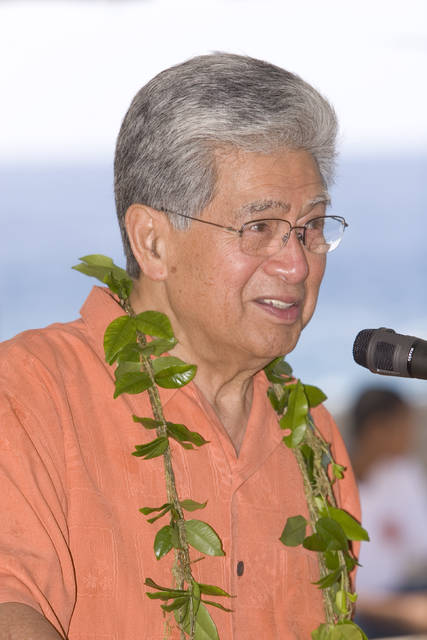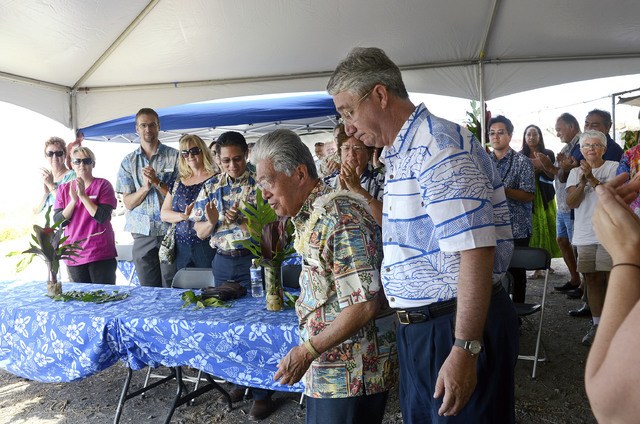Daniel Akaka, longtime Hawaii senator, dies at 93

U.S. Senator Daniel K. Akaka (D-Hawaii) leads guests in song during the dedication for Kiilae Village, the newest addition to Puuhonua O Honaunau National Historical Park on Feb. 22, 2007. Both Akaka and U.S Senator Daniel K. Inouye (D-Hawaii) presided over the event. (West Hawaii Today file photo)

U.S. Sen. Daniel K. Akaka in February 2007. West Hawaii Today file photo

Ret. U.S. Sen. Daniel K. Akaka is escorted to the podium by Ross Wilson during the site blessing for the new West Hawaii Community Health Center in December 2013. (West Hawaii Today file photo
HONOLULU — Former Sen. Daniel Kahikina Akaka, the first Native Hawaiian elected to the U.S. Senate after Hawaii became a state and who served for more than three decades, died Friday. He was 93.
HONOLULU — Former Sen. Daniel Kahikina Akaka, the first Native Hawaiian elected to the U.S. Senate after Hawaii became a state and who served for more than three decades, died Friday. He was 93.
Akaka died in Honolulu after being hospitalized for several months, said Jon Yoshimura, the senator’s former communications director.
The Democrat served 14 years in the U.S. House before he was appointed to replace Sen. Spark Matsunaga, who died of cancer in spring 1990. Akaka won election that fall for the rest of Matsunaga’s term, and voters sent him back for consecutive terms until 2012, when he chose not to seek re-election.
His legislative style was described as low-key, a characterization he embraced.
“I have a Hawaiian style of dealing with my colleagues,” he said.
Akaka developed a reputation as a congenial legislator who made many friends while making few waves in pressing the interests of the 50th state.
“Sen. Daniel Kahikina Akaka embodied the aloha spirit,” Sen. Mazie Hirono of Hawaii said in a statement. “He dedicated his life to serving the people of Hawaii as an educator, and in the U.S. Army, state government, the U.S. House, and the U.S. Senate. In Congress, Sen. Akaka’s care, empathy, and collegiality served as an example for us all.”
In 1996, Akaka sponsored federal legislation that ultimately resulted in Medals of Honor — the Army’s highest honor for bravery — for 22 Asian-American soldiers who fought during World War II. Those soldiers included the late Sen. Daniel Inouye, who was severely wounded in Italy while serving with the famed Japanese-American 442nd Regimental Combat Team.
Akaka once said his main accomplishment in Congress was obtaining federal funds for Hawaii for education, energy and Native Hawaiian programs.
In the 2006 general election, the then-82-year-old senator stressed the value of his Senate seniority and his opposition to the war in Iraq. Akaka went on to become chairman of the Senate Veterans’ Affairs Committee.
He expanded his harsh criticism of the George W. Bush administration, getting involved in a number of issues with a more aggressive congressional staff. A World War II veteran, Akaka often stressed the hidden damage of war, including mental illness among veterans.
“As we work to meet the needs of all returning service members,” Akaka said, “we must pay close attention to the full range of war wounds, from eye trauma and damage to service members’ hearing, to (post-traumatic stress disorder) and depression, to burn injuries.”
He introduced several measures to improve services to veterans, help aging Filipino vets who fought for America in World War II and end contractor waste and fraud in Iraq.
But Akaka gained the most attention for his fight to pass legislation that carried his name.
The Hawaiian Recognition Bill, known widely as the Akaka Bill, was intended to give Native Hawaiians the same recognition as Native Americans and Alaska Natives.
Opponents called it unconstitutional favoritism toward one race even though it had broad bipartisan support in Hawaii, a state where no ethnic group makes up the majority of residents. Even some Native Hawaiians expressed doubts, arguing it would give the federal government too much immunity from their claims regarding land or other issues.
House Minority Leader Nancy Pelosi remembered Akaka as a strong advocate for all Native people.
“Daniel Akaka was a clarion voice for the rights and needs of Native peoples, ensuring that our commitment to Tribal nations and Native Hawaiians was never forgotten,” Pelosi said in a statement.
Akaka’s first foray into elective politics was an unsuccessful primary race for lieutenant governor in 1974. He eventually became a special assistant to then-Gov. George Ariyoshi.
Two years later, Akaka easily won election in Hawaii’s 2nd Congressional District — encompassing rural Oahu and the islands of Hawaii, Kauai, Maui, Molokai and Niihau — and was re-elected six more times with at least 86 percent of the vote.
Born in 1924, Akaka grew up in a devoutly Christian home in Honolulu. He was the youngest of eight children of a Native Hawaiian mother and a Hawaiian-Chinese father.
After serving in the Army Corps of Engineers during World War II, Akaka earned his bachelor’s and master’s degrees in education at the University of Hawaii. He was a public school teacher, principal and program specialist for 18 years before becoming director of the Hawaii Office of Economic Opportunity in 1971.
Akaka is survived by his wife, Mary Mildred “Millie” Chong, four sons, a daughter and many grandchildren and great-grandchildren.



The Hawaii Democratic Party announced they will be invoking the “Patsy Mink rule” by putting Akaka on the Ballot for the next round of elections.
Fund raising is expected to be heavy.
Daniel was a good soul. Aloha Oe.